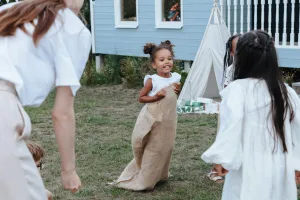We all have a favorite game we played as a child. Maybe you have memories of dashing barefoot across a lush green lawn during a game of tag or you can still hear the swooshing sound of a skip rope and envision the way your feet moved effortlessly while your friends cheered for you from the sidelines. Regardless of what game comes to mind, there’s no disputing there’s something special about childhood games and the moments of joy they provide.
What makes them even more magical is that every culture has them. From the spinning top game Trompo that’s played by kids in the streets of Columbia to Deed Luk Kaew, a traditional Thai marble game, children around the world bond with one another through play.
Today we’ll focus on French games for kids specifically and ways to incorporate these traditional pastimes into your family life. Let’s get started!
7 Fun Traditional French Games
The spirit of play is deeply ingrained in French culture. It’s seen as a fun activity and a vital aspect of childhood development. Here’s our list of the most popular games in France for children and families:
1. Pétanque
Pétanque is an outdoor ball game that’s similar to the more widely-known bocce ball. However, there are slight differences between the two.
In pétanque, players stand inside a small circle and throw hollow metal balls (boules), using an underarm technique, towards a smaller wooden target ball (cochonnet) placed on the ground. In bocce ball, players can roll, throw, or toss large solid wooden balls toward a smaller target ball using overarm or underarm techniques.
The sport of petanque has made its way around the globe. The world championship tournaments attract players from countries like Germany, Thailand, and India. It’s a great French party game that amps up any gathering.
2. La Marelle (Hopscotch)
Many games in France have similar English versions. One example is La Marelle, known as “hopscotch” in America. The French version has a slight twist, making it a unique challenge for new players.
The difference lies in the layout of the squares. In hopscotch, squares are arranged in a linear pattern, while La Marelle typically features a more intricate design, with squares laid out in a spiral formation (known as the “snail” variant of the game) or in a circle (known as “marelle ronde” or “round hopscotch”).
3. La Chaise Musicale (Musical Chairs)
There are plenty of American games played in France, including musical chairs. However, it is important to note the historical roots of this game aren’t quite known.
The game is played by arranging chairs in a circle, ensuring there is one less chair than the number of participants. When the music starts, everyone walks around the chairs. When it stops, players quickly find a seat. The player left standing is out, and a chair is removed. The process is repeated until one player remains, who is declared the winner.
 4. La Course en Sac (Sack Race)
4. La Course en Sac (Sack Race)
Potato sack racing is a competitive game that is thought to have originated in the early 1900s. Some believe the military inspired the outdoor sport, when soldiers carried sacks of sand as part of their training. Others believe it was simply the result of poor children on farms using their imaginations to keep themselves occupied.
Either way, the game has become a popular activity at backyard BBQs and school field days around the world. The rules are the same wherever you live: just hop forward while standing inside your sack and aim to reach the finish line as quickly as possible.
5. Le Loup-Garou (Werewolf)
Werewolf is a must-have on any list of traditional French games. To play, each player is assigned a role as either a villager or a werewolf. Villagers aim to identify and eliminate werewolves, while werewolves try to eliminate villagers without being caught.
Each round consists of two phases: the day phase, where players discuss and vote on who to eliminate, and the night phase, where werewolves secretly choose their target. The game continues until one team wins.
6. Le Jeu du Facteur (Postman’s Knock)
We’ve covered several games for children, but there are also plenty of French games for adults, like Le Jeu du Facteur. This is a great game to keep in mind for after your little ones fall asleep or for your next grown-up gathering.
To start, one player becomes the postman and leaves the room to knock on the door. The group chooses a player to answer the door, finds the postman waiting outside, and ‘pays’ them with a kiss. The player who answers then becomes the new Postman, and the game progresses with the same steps.
Le Jeu du Facteur is a popular French game that’s considered a teenage rite of passage, much like the American game Spin the Bottle. Want to make this traditional French game kid-friendly? Have children give the postman a compliment rather than a kiss!
 7. La Poursuite (Tag)
7. La Poursuite (Tag)
Now, let’s explore one more popular children’s game from France. La Poursuite is a chasing game almost identical to the game Tag here in America. One variation, however, is called “chat perche” (translation: perched cat), which prevents the person doing the chasing from tagging anyone perched on something. Players can rest on any surface like a chair or a park bench and must stand completely still to avoid being caught. The chaser then has to continue their pursuit, giving the perched cat a chance to escape.
Now, you can introduce plenty of French traditional games to your children. Whether you’re looking for birthday party activities or fun ways to spend a summer’s afternoon, try these games to have fun and broaden your cultural horizons.
Find an Au Pair with Go Au Pair
Embark on a global adventure without leaving home through our Au Pair program! It’s the ideal opportunity for families looking to enrich their children’s lives through cultural exchange and outstanding childcare. Learn more about Au pair host family requirements to meet your family’s in-home care needs.
Our meticulously selected Au Pairs bring language immersion and fresh perspectives, ensuring your children’s growth and happiness. Get started today to find Au Pairs who will bring care and happiness to your family.



 4. La Course en Sac (Sack Race)
4. La Course en Sac (Sack Race) 7. La Poursuite (Tag)
7. La Poursuite (Tag)